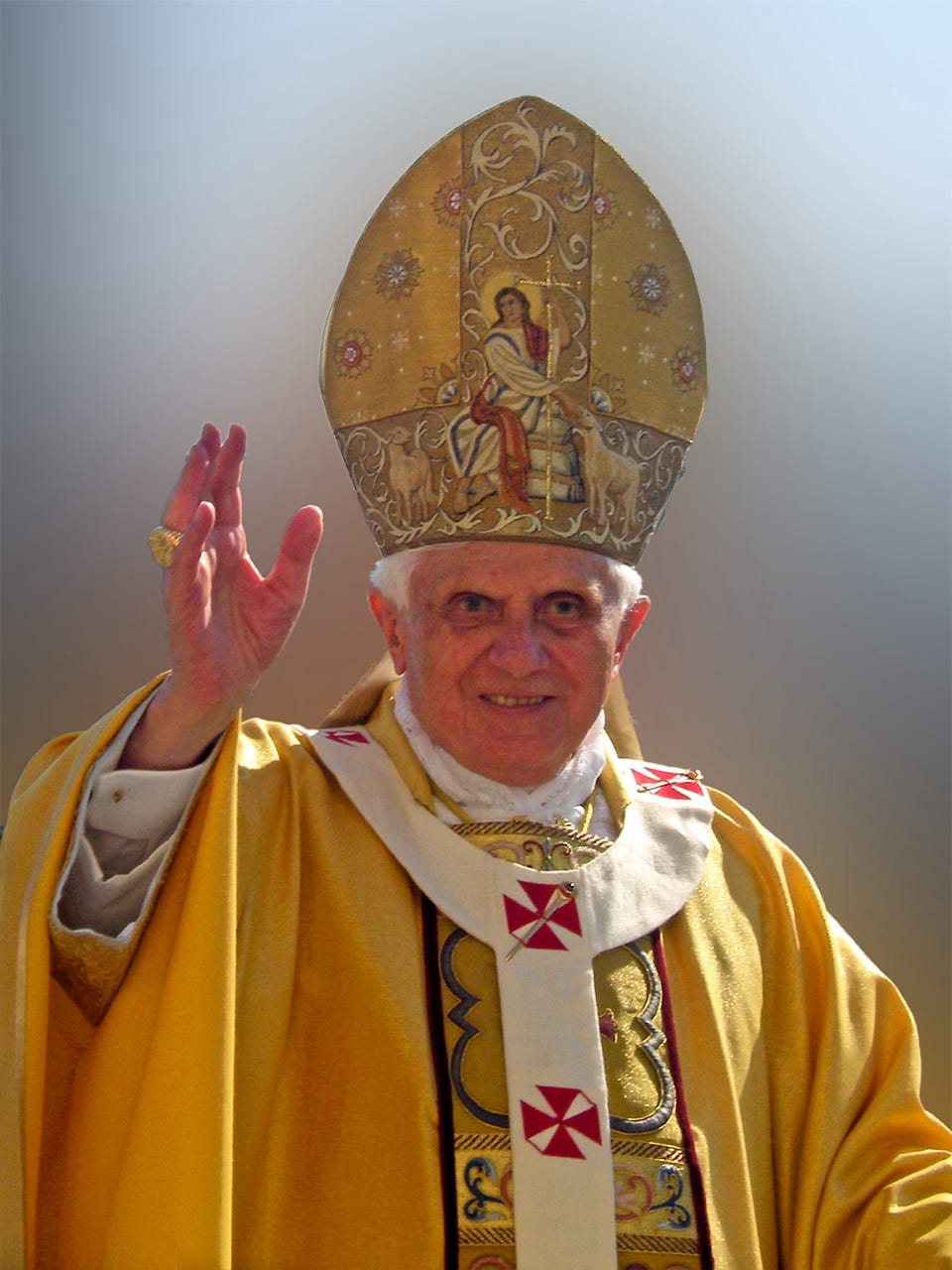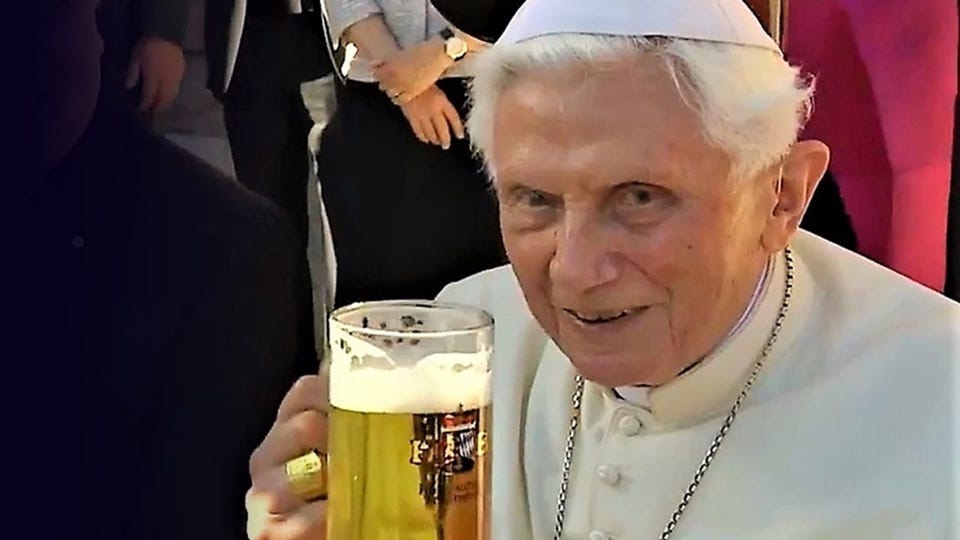
Articles by Category
Jesus Über Alles!
Has Germany finally found redemption from its past?
By John Mallon
We are all well aware of the evil that Wemerged from our homeland during the Twentieth Century, and we acknowledge it with shame and suffering. During these days, thanks be to God, it has become quite evident that there was and is another Germany, a land of singular human, cultural and spiritual resources. I hope and pray that these resources, thanks, not least, to the events of recent days, may once more spread throughout the world! Now young people from all over the world can return home enriched by their contacts and their experiences of dialogue and fellowship in the different regions of our homeland. I am certain that their stay, marked by their youthful enthusiasm, will remain as a pleasant memory with the people who have offered them such generous hospitality, and that it will also be a sign of hope for Germany. Indeed one can say that during these days Germany has been the centre of the Catholic world.
—Pope Benedict XVI,
August 21, 2005, World
Youth Day Farewell Ceremony, Köln/Bonn International Airport
A friend told me that when it became clear in the conclave that Cardinal Ratzinger was the next Pope, Cardinal Joachim Meisner of Cologne wept. He is reported to have said that this election finally meant the end of the Second World War. A priest who was present at Pope Benedict XVI’s visit to the synagogue in Cologne during World Youth Day reported on EWTN that he was sitting next to an elderly Jewish woman, a Holocaust survivor, who was weeping. He asked if she was all right and she said, “Yes. This means for me that the Second World War is finally over.”
In my limited world travels I have visited Germany perhaps more than any other country. I love to visit Germany, and during my visits there I have always experienced two distinct sensations.
As for the first, I simply gloried in the way Catholicism permeated the culture.
You could feel it, Catholicism was in the very soil and the air you breathed. As an American, this was very strong to me, as the United States is a predominantly Protestant country with a tradition of separation of Church and state. But Germany, like most of Europe, was formed in the cradle of Catholicism, and it is beautiful.
In any store you could find red grablichts, or grave candles with St. Therese of Lisieux’s picture on them to place on the graves of loved ones, and each grave had a small vessel or indent in the rock with a lid for Holy Water and a little brush for sprinkling (and they were not empty). Each farmer’s field had a crucifix in one corner with the dates on it to bless the field.
I loved how each town and village had a very beautiful church in the center of it. The Autobahn had small chapels (Autobahnkapelle) along the roadside in case you wanted to stop for a visit on the road. Public buildings had crucifixes on the walls.
In Catholic southern Germany, at least, they celebrate Catholic customs unknown or forgotten elsewhere, like my favorite, the blessing of wine (Johanniswein) at the end of Mass on Johannestag, December 27, the Feast of St. John. Epiphany is not moved to the nearest Sunday and forgotten, but is a real feast with ceremonies where chalk is blessed to inscribe a blessing over the entrances to the home, and where children dressed as the Magi (Sternsingen) go door to door to sing and collect money for the poor.
And I will never forget the huge stainless steel beer brewing vat at the Abbey at Weltenburg on the Danube with a gigantic crest reading, “Ad Jesum per Mariam” on the side of it. What a country!
The other sensation I felt in Germany was not so joyous. I felt a heaviness, a gloom in the air, like a pall, as if this was a country under a cloud of sadness, a sense of shame. Yes, the shadow of the Holocaust hangs in the air and on the faces of many Germans.
My last trip to Germany was much too long ago in 2000. I attended a three-week seminar in the beautiful ancient Catholic university town of Eichstätt, led by Dr. John Haas of the International Institute of Culture (http://www.iiculture.org). (The same trip that took me to the monastic brewery in Weltenburg.)
I was attending the Eichstätt Altstadtfest (old town festival) with fabulous food and beer served by girls who looked like they just stepped off a St. Pauli Girl bottle. In the midst of the celebration I met Oskar, 18, who opened up to me at the end of the festival. He said, “I’m proud to be a Bavarian but ashamed of being German.” I asked why. He said, “Because of things my country did, the things people in my family did.” I sensed he was near tears. I told him he wasn’t responsible for that, but if he felt so strongly perhaps he could dedicate his young life to making “never again” a reality, with God’s help, by joining the worldwide pro-life movement.
It is very poignant that such a young man, born 40 years after the fact, should carry this burden. Could it not be a time for a healing of memories? Redemption? We must never forget the Holocaust, but the wound of the Second World War must be healed for the world and Germany to go on. Much has been said about the German Pope making his first foreign visit to Germany, by the design of Providence, an arrangement Benedict himself said he wouldn’t have dared ask of God.
But God delights in giving that for which we wouldn’t dare ask. Furthermore, the German Pope’s first visit abroad — home — was also to the youth of his country, and the youth of the world.
Could it be anything other than God’s Providence that closed the 20th century and opened the 21st with two Popes who were formed under the two most oppressive ideologies of the 20th Century, Nazism and Communism? The horrors of the Second World War dragged on for those in the Eastern Bloc under Communism and John Paul II played a key role in shutting Communism down, with a reunited Germany one of the first signs and first fruits of that collapse.
Germany has endured the shame and guilt of two world wars, the unspeakable evil of the Holocaust, being split in two with one half under Communist oppression, and decades of suspicion, bad jokes and ridicule.
Now we begin a new century — a new millennium — with a German Pope on his first pastoral visit, significantly, to the world’s youth — our future — in Germany.
I hope Oskar was there.
John Mallon is the Associate Editor of Inside the Vatican.

